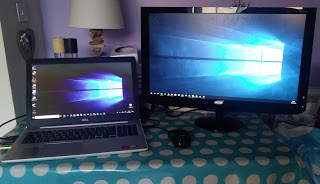I am Andrew Watson, and This is How I Work
 Today, I have the pleasure of interviewing Andrew Watson for the “How I Work” series. Andrew is a second year Doctorial Researcher at the University of Glasgow. By day Andrew is a Data Analyst for an Insurance Provider and by night is researching peoples bodily and sensorial engagement with Neolithic funerary monuments.
Today, I have the pleasure of interviewing Andrew Watson for the “How I Work” series. Andrew is a second year Doctorial Researcher at the University of Glasgow. By day Andrew is a Data Analyst for an Insurance Provider and by night is researching peoples bodily and sensorial engagement with Neolithic funerary monuments.
Current Job: I work full time as a Data Analyst and study part time for my PhD in Archaeology
Current Location: Somerset, UK
Current mobile device: LG K8
Current computer: Dell Inspiron
Can you briefly explain your current situation and research to us?
I’m a part time PhD student in archaeology using a phenomenological approach to understand peoples bodily and sensorial engagement with Neolithic long barrows. I’m interested in how much of our experiences today could be similar to that of people in the Neolithic.
What tools, apps and software are essential to your workflow?
I don’t use any fancy tools, apps or software. I have a word document that I update whenever I study and start a new one weekly. It has numerous headers including things to be done this week, things to be done in the future, what I plan to do, what I actually did, upcoming deadlines and things to work on when I have spare time(!).
What does your workspace setup look like?
I’m a distance learning student so I study at home primarily and sometimes visit a local university library. With the arrival of my son my workspace has diminished somewhat from a big desk in my spare room, to a smaller desk in the living room, to one in the bedroom, to now using my laptop with a second monitor on the dining room table and tidying it away each time.
What is your best advice for productive academic work?
Break tasks down into smaller chunks and work towards these first. Ultimately for me if what I’m working on will not help me finish my thesis then is it a priority? Do I have time to be working on a side project? Sometimes the answer is yes, and this is fine, but other times you need to say no to things or put them to one side until the key deadline is met.
Managing time well is key for a part time and distance learning student.
How do you keep an overview of projects and tasks?
My trusty notebook and weekly to-do list!
Besides phone and computer, do you use other technological tools in work and daily life?
Not that I can think of.
Which skill makes you stand out as an academic?
While I wouldn’t class myself as an academic yet, as I don’t have my PhD, I believe I am self-motivated, determined and have good time management. As I’ve studied from my Undergraduate degree via distance learning I’ve had to find ways of keeping myself motivated and focused over the almost 10 years!
What do you listen to when you work?
While not my usual cup of tea, dubstep is quite good when I need to focus. I think this is because it’s quite repetitive. Rock music too like Iron Maiden or AC/DC is good too!
What are you currently reading? How do you find time for reading?
You can’t write before you’ve read… well at least for your literature review. Reading is important, not just books or papers written previously but it’s also important to keep on top of new papers being published. There are many journal notification emails that I’ve signed up to but it’s important to set some time aside each week to read and keep on top of things.
What am I reading now? Numerous things on qualitative and phenomenological research as my fieldwork is due to take place in a few months!
Are you more of an introvert or extrovert? How does this influence your working habits?
While I potentially come across as an extrovert, I believe I have become an introvert over the years. I’m confident in my research but sometimes wonder if my ideas are quite abstract and fear negative peer-feedback and how that may knock my confidence.
What’s your sleep routine like?
Sleep is important. As a dad, full time employee and part time student it is important to get enough rest! I tend to aim for around six hours a night. Any more and I feel less productive the following day, any less and it usually catches up with me a day or so later.
What’s your work routine like?
Since the birth of my son I’ve struggled to motivate myself at the end of a busy day either being a dad or working in my (sometimes) mentally draining job. The thought of sitting down to a few hours of work was not appealing. Equally, if my son had a bad evening, didn’t settle or woke up late into the evening I couldn’t get things done. Instead I’ve found getting up around 4:30am allows me two hours to work while everyone else is asleep and then I can get ready at 6:30am to get into the office to start my day. This then allows me the luxury of sitting down some evenings and having time to myself!
What’s the best advice you ever received?
Pace yourself and set realistic goals. I’ve previously agreed to take on too much or set very ambitious targets and not reached them. This can be most disheartening. Setting realistic goals, which only you know what you can achieve, will help you have a more positive experience!
Oh… and share your ideas at an early stage! I’ve mulled over and stressed about ideas wondering if they are worth sharing and when I finally do they are usually well received and supported by colleagues.

